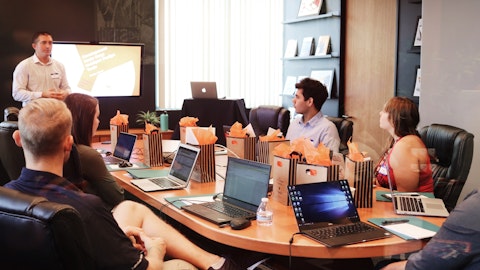Robert Dodd : One other question, in your prepared remarks, you expect a mild to potentially monitor recession in 2024, which — that’s wide nature of things that could happen in 2024 once no recession or maybe moderate. How much does that view affect your concerns about, for example, [indiscernible], some of the more stressed credits. So the more stress the credit is before a session, the more trouble it’s likely you have in one. So would you say — if there is no recession, would you say that as with that have a material positive changing your view on outlook for those stress credits? Or could you give us any indications there?
Stuart Aronson: American Crafts and Play Monster are both already suffering from a softness in consumer demand that has been going on for a while now. We are working with both of those companies to cut costs and optimize value. And if there is a stronger economy next year than we’re currently envisioning that could be positive for both of those credits, which are driven or impacted directly by consumer appetite. But we do think we have those assets marked as of the end of the quarter at levels that were reflective of current market conditions. And as I indicated, those current market conditions are pretty soft.
Robert Dodd : Got it. I appreciate that. And then on the 1 and 3 quarters, let that and more the over 1 turn leverage, the 1 and a quarter. That’s — there’s not a lot of comps that are one in the quarter. I had the 1 or 3 quarters I can see the 1 or 2 quarter — I mean, those that have a lower management fee over return leverage tend to be 1. So can you give us any thoughts on why a quarter there? I mean, it’s marginal, right? Because obviously, on price a very small piece of the capital base in effect. But any thoughts on why that relative to most in the industry, one, if they have anything on that front?
Stuart Aronson: Yes. All I can tell you is that in discussions with the Board the reduction on the core management fee from 2% to 1 or 3 quarters was considered to be the main focus and the Board felt comfortable that the 1.25 on assets over 1x leverage was a reasonable rate given what we do and the labor content that goes into the transactions that we originate making. Talking about, Mickey — I’m sorry, Robert.
Robert Dodd : And one last one for me. On the nonsponsor piece of the portfolio, which is down to basically 1/3 now, I think, if I’m in the right slide on the first Page. What would you expect over the next 12, 24 months, would you expect that to rise? Or is that going to continue relatively speaking to decline as a share of the portfolio on a forward basis here?
Stuart Aronson: Our originations pipeline has been and continues to be about 1/3 nonsponsor and 2/3 sponsor. So I would expect that ratio in the portfolio to remain fairly stable based on what we’re seeing right now.
Operator: We have reached our allotted time for questions. I will turn the program back over to our presenters for any additional or closing remarks.
Stuart Aronson : I appreciate everybody’s time today. As always, if there are more questions that we can answer, we’re happy to answer them either off-line or get indications prior to the calls of the types of things that shareholders or analysts would like to hear from us. We want to be as transparent as possible and we’ll continue to do that going forward. So thank you, everyone, for your time.
Operator: Thank you. This does conclude today’s program. Thank you for your participation. You may disconnect at any time, and have a wonderful day.
Follow Whitehorse Finance Inc. (NASDAQ:WHF)
Follow Whitehorse Finance Inc. (NASDAQ:WHF)
Receive real-time insider trading and news alerts




